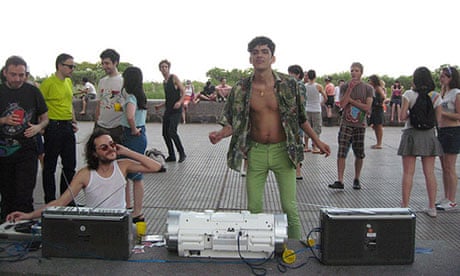If you want to get an insight into a country, advises Matias Aguayo, if you want to get a sense of how it imposes law and order, how it seeks to control its public spaces, then throw an impromptu street party.
The 37-year-old musician – best known for his releases on German techno label Kompakt, and his vocal on Battles' Ice Cream – has spent much of the past six years staging flashmob-style events across South America, with often revealing consequences. In Santiago de Chile, his BumBumBox [BBB] party got "a bit violent", as the police broke up the fun. In Colombia, the riot vans descended, not to stop the show but to disperse the homeless street kids who had started dancing with – or as the police saw it, harassing – the BBB crew. In Buenos Aires, the police simply scratched their heads. "Cops can be quite square," chuckles Aguayo. "Is 50 people dancing on a corner legal or not? It's not in the rulebook. They never know what to do."
On Friday 17 Jun, however, the BBB team faces possibly its sternest test yet: Newcastle upon Tyne. The police are onside, and the event is part of ¡VAMOS!, Newcastle's annual festival of Spanish and Portuguese-language cultural events. But will Newcastle's shoppers and office workers be up for a boogie around Grey's Monument? And what will they learn from getting down, in broad daylight, on a Friday afternoon?
"It may sound crazy but we've never had a party that didn't work," insists Aguayo, speaking from his current base in Berlin. "On the street, it's never boring." Indeed, the last BBB party in Europe, at a festival in Norway, went right off: "Norway's this very rich, very calm and controlled socialist country, and [the crowd] got so enthusiastic they started to make a big fire and whatever. They really lost it."
The BumBumBox parties started in Buenos Aires, after Aguayo moved there in 2003. A Chilean who had grown up in Cologne (his parents were Pinochet-era political exiles), he was "seduced by a city" and its electronic music scene. "It is practically impossible to make a living out of underground music in South America, says Aguayo, but in Buenos Aires he discovered a vibrant, highly localised scene of crazy cellar nightclubs and passionate amateur DJ-producers. It was inspirational.
That golden moment came to an tragic and abrupt end in December 2004, when nearly 200 people were killed in a fire at Buenos Aires nightclub República Cromagnon. In the aftermath, stringent new safety laws were passed and, by Aguayo's estimation, 90% of the city's smaller, edgier clubs were closed.
'It wasn't a concept, like: We're going to do this intervention in urban spaces. It was done out of necessity. The clubs all play the same music. Let's stay outside and dance'

Bored, Aguayo and his friends resorted to wandering around town with a boombox, hooked up to an MP3 player. One night, as they stood chatting and dancing in the street, more people joined them, including a street vendor selling coffee and beer. "Suddenly," recalls Aguayo, "we had a good party going and a bar as well." By the next morning, the idea had been hatched to make BumBumBox a regular event: "It wasn't a concept, like, 'We're going to do this intervention in urban spaces.' It was done out of necessity. The clubs all play the same music. Let's stay outside and dance."
Over the next 18 months, BBB took off. His cohorts Gary Pimiento and Pablo Castoldi would identify locations, while Aguayo and his friends would prepare 30-minute DJ sets, which would be played as MP3s through a growing mobile soundsystem of speakers and boomboxes. Using word of mouth, MySpace and Facebook, BBB would attract a core crowd, but the crucial factor was always the general public's reaction. It's important, says Aguayo, that the parties are free, friendly and inclusive: "It's a very active process. Maybe, sometimes, we just make 10 people dance, but you can't just press play and see what happens. You have to participate."
As word spread, the BBB crew began to take the party to other South American cities. Sometimes that would be at the invitation of a local arts organisation, sometimes under their own steam. "Going to Santiago was us, on the bus, Fitzcarraldo-style, with five boomboxes, to cross the Andes and make a party." BBB also gave birth to the label, Cómeme.
At the parties, certain styles of music – traditional cumbia, say, or old-school house full of claps and rim shots – would work, and others, like minimal techno, wouldn't. Consequently, a broad BBB sound evolved, which an increasingly widespread network of collaborators began to riff on.
Making dance music specifically for street parties and writing tracks collaboratively, online, fundamentally changed the music that Cómeme artists began to record. "The audience is of several ages and different social backgrounds, so, obviously, you can't rely on the codes understood by [regular clubbers]," says Aguayo, adding: "Music always tells you more about the conditions under which it was made, rather than its intention. You can try to make it sound wild and crazy, but if you made it in an office I think, somehow, you will still hear the office. The inspiration of the street is reflected [in Cómeme's music]. It speaks an open language."
Unlike Aguayo's effervescent solo work, such as his club scene-baiting underground smash Minimal (a broadside against arid, sexless minimal techno) or his most recent album, Ay Ay Ay – a giddy, skittish carnival of beats and whimsical melodies – the Cómeme "sound" is less notable for its South American sense of rhythm and percussion, than its tacking to dark analogue electronic sounds of an Italo disco-Chicago house vintage. Aguayo ascribes that to many South Americans first discovering house music, retrospectively, on YouTube. Capracara, AKA Jonathan Burnip, a Sedgefield-born producer who has worked with Cómeme on the Newcastle soundtrack, shares their fondness for "primitive equipment".
But will Newcastle work? Aguayo is breezily confident: "The good thing about the street parties is the unexpected. It always provokes something."







Comments (…)
Sign in or create your Guardian account to join the discussion